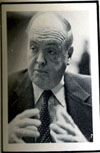 |
Home | Search | Browse | About IPO | Staff | Links |
 |
Home | Search | Browse | About IPO | Staff | Links |


The Rostrum By EUGENE KENNEDY, Professor of psychology, Loyola University Personality and politics Eugene Kennedy's comments are excerpted from a presentation made at the "Crossroads 82" conference at Sangamon State University in October 1982. His novel, Queen Bee (Doubleday), was also published in October. — Editor MOST OF THE important things we learn in life are simple. Conrad Hilton, the famous hotel magnate, was once asked what he had learned in his long, extraordinary life. He said he had learned that if he put the shower curtain in the tub before he turned on the shower, it worked better than if the curtain was outside the tub. There's something equally simple we should all keep in mind as the mayoral campaign in Chicago heats up: Personality is destiny. People, in other words, will be what they are despite the most drastic efforts of media consultants. However Jane Byrne dresses or styles her hair, she'll still be, for good or ill — "herself." We all know this is true. Think of someone you went to grammar school with who later became successful. Then you hear this person cheated on his income tax. And you say, "I'm not surprised. He used to cheat in the first grade." There is something very consistent about us from our earliest years, despite what media consultants may do. Small children seem to get a feel for adults very clearly. You try to coax a kid into doing something she doesn't want to do. The kid refuses. You ask why. "Because I don't like you," she'll say, and that's really all there is to it. Suppose you put a small child in front of a television set and Jane Byrne came on. Chances are that after a minute or two the child would ask, "What's she mad about?" Because no matter what Jane Byrne says, the inner hostility, the conflict that seasons her personality so abundantly, comes across to the viewing public. It works across the political board. You cannot undo Ronald Reagan's personality. People will persist in liking him. People identify with this genial figure, not because he is a political wizard, but because he is so much like every other American: confused. If you ask the average man in the street about conditions in the United States today he will say, "I don't know what to do about them." When Ronald Reagan comes on television he, too, seems to say, "I don't know what to do about them either." But people like him all the more because he's confused and troubled. Look at him. He's divorced. He's got this kind of mixed-up family from two marriages. Kids who continually embarrass him. He's a real American, and all kinds of middle-aged and older people identify with him because they're in the same boat, basically. Now Jane Byrne is trying to control her destiny by changing her personality — at least the public version of it. She has hired a media consultant from New York whose plan is to keep her out of public view as much as possible between now and primary time. They want her to be nice, to be sweet and reasonable and not say impulsive things or make decisions when she is walking down the hall to the elevator. Now how long do you think she is going to be happy living like that? The real Jane Byrne will emerge. She was elected the first time because she was angry, because she stood out in the snow next to the bus stops with the snowflakes coming down. And the rest of the city was also angry, and they elected her. She is not going to be reelected by trying to be otherwise. Her personality is her destiny. And part of that personality is her remarkable capacity to do startling things that seize the media's attention. Like finally opening the schools after a long strike, even though she had to use sealing wax and wires to do it. And then, the very next week, taking $145,000 from the public library in order to finance her political newspaper, City Edition. She just can't be too good for too long. Another part of her personality is that she craves excitement like a drug addict craves a fix. She is simply bored by routine. And governing, despite its glamour, involves a great deal of routine. So Jane Byrne revels in crises, when the rules and routines can be suspended for a while. I interviewed her on the day that the firemen struck in Chicago. And far from being depressed or upset, as she might well have been, she was at the top of her form — beaming, radiant, the star of a titanic and unparalleled drama. She was where she wanted to be, at the very center of the stage in a situation full of danger, and she couldn't have been more pleased. If Jane Byrne wasn't what she is — mean and angry and fixing for a fight — there wouldn't be a serious challenge to her. Without Jane Byrne, Richie Daley might still be in Springfield, a relatively obscure state senator. Were it not for Jane Byrne's campaign against Daley, fed by her real personality, he would not now pose the greatest threat to her reelection. There may be something subconscious working here, a funny strand in the fabric of Byrne's personality that makes her want to restore her mentor, through his son, to the place of power in Chicago. But whatever the motives, character will out. Remember that kid who cheated in first grade. You can't change personality with all the media consultants in the world. That is the most important factor to remember in the forthcoming mayoral campaign in Chicago.□ February 1983 | Illinois Issues | 39 |
|
|